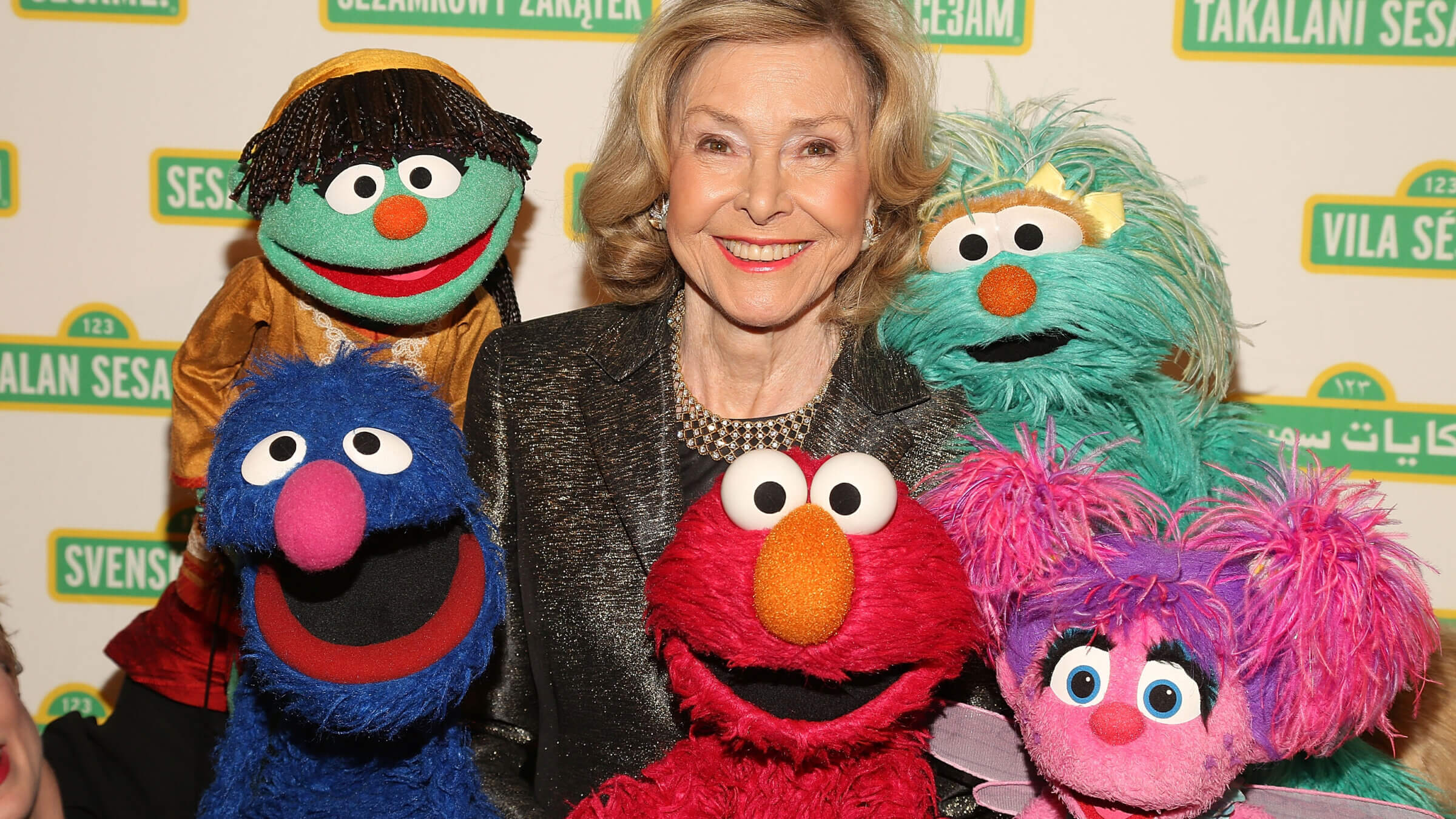Why Jews will miss the Corporation for Public Broadcasting terribly
Targeted by Trump, CPB — which helped bring us documentaries about Jewish culture as well as ‘Sesame Street’ — will close next year

Joan Ganz Cooney and the Sesame Street Muppets, 2015. Photo by Getty Images
Since 1967, the Corporation for Public Broadcasting (CPB) has been almost entirely funded by Congress. On Aug. 1, CPB announced that it will close next year, following a White House initiative to end its decades-long contribution to American education and culture. American Jews will soon have the opportunity to see how Jewish heritage survives even after audiovisual evidence of Yiddishkeit is wantonly silenced by elected officials in Washington, DC.
Jewish audiences may be familiar with such splashy CPB-cosponsored productions as the 2008 miniseries The Jewish Americans, written and directed by David Grubin, which examined such personalities as Supreme Court Justices Louis Brandeis and Ruth Bader Ginsburg, athlete Hank Greenberg, and feminist Betty Friedan, among others. The goal, Grubin claimed, was to see how Jews embraced America, yet tried “to hold on to their identity as Jews. And that tension interested me.”
Further tension is now palpable in hundreds of local public radio and television stations nationwide which relied on CPB backing. Some of the Yiddishkeit involved is contained in such humble outlets, as well as in highly publicized shows such as Ken Burns’s 2022 documentary series The U.S. and the Holocaust and Defying the Nazis: Sharps’ War, all made possible in part by CPB. Defying the Nazis was a documentary about an American minister and his wife from Massachusetts who saved Jews and other refugees fleeing Nazi-occupied Europe.
Awareness of a diverse history is an essential element of CPB, just as it is of modern Jewish experience. Last year at a public media summit, CPB president Pat Harrison noted that as a girl in Brooklyn, she observed that none of her classmates had grandparents, uncles, or cousins because “they were all murdered in the Holocaust.” Presciently, Harrison quoted the words of the German theologian Martin Niemöller, who after surviving wartime imprisonment in Sachsenhausen and Dachau concentration camps, wrote about the silent non-objector in society who kept quiet when Fascists imprisoned the Jews, because he “wasn’t a Jew.”
After non-intervention when communists, trade unionists, social democrats, and other groups were persecuted, Niemöller’s anti-activist noticed that by the time it was his turn to be targeted, no one was left to utter a word of protest. This Holocaust-associated enlightenment led Harrison to a career in public media: “Here we speak for everyone,” she proclaimed.
No less urgently conscious of the tragedies of 20th century Jewish experience is Kevin Klose, former president of National Public Radio. In 2006, upon receiving an award named in honor of broadcaster Edward R. Murrow, Klose noted that in 1942, Murrow informed listeners that the Germans apparently hoped to escape “retribution” by the “sheer magnitude of their crimes.”
Murrow added that the Nazis were “exterminating the Jews” with “ruthless efficiency.” Accompanying the U.S. Third Army to liberate Buchenwald concentration camp, and mostly rendered speechless by what he saw there, Murrow again called for “retribution” to “those responsible for the cold-blooded massacre of Jews in Poland.” Klose reminded the CPB audience of this precedent because Murrow’s words remain “real and cautionary” today.

Less obvious traces of Jewish experience were visible in such CPB-aided ventures as Sesame Street, co-created by the American Jewish writer-producer Joan Ganz Cooney and featuring the Jewish character actor Will Lee as Mr. Hooper, as well as the Israeli adaptation, Rechov Sumsum, known internationally as Shalom Sesame.
Even Mister Rogers’ Neighborhood, hosted by the genial Presbyterian minister Fred Rogers, which likewise relied on the CPB, had a certain Jewish impact. Rogers was a longtime mainstay of Squirrel Hill, a Pittsburgh Jewish neighborhood, where he drew from traditions ranging from the concept of tikkun olam to inclusion of a tzedakah box in one episode. And Rogers consulted with a friend, Rabbi Earl Grollman, when preparing a segment to inform children about divorce.
Some CPB encouragement turned out to be indirect. John Rubin, award-winning producer of the long-running science series NOVA, a leading CPB product, has more recently executive produced Raise the Roof, a documentary about a project to reconstruct an 18th century wooden synagogue design in Gwoździec, Poland.
Jews were always part of the CPB mix. The popular 2022 series The Great American Recipe featured a Jewish judge, chef Leah Cohen, of Filipino and Romanian heritage, and a contestant, Brad Mahlof, who expressed his Sephardic and Ashkenazi roots from Libya and Europe.
Rabbi David A. Teutsch’s Imagining the Jewish Future observes that another CPB honoree was Richard A. Siegel, longtime executive director of the National Foundation for Jewish Culture. And yet another overachiever singled out for plaudits by CPB is Carol Edelman, Emerita Professor of Sociology and Holocaust Studies at California State University, Chico.
With such persistent interest in Yiddishekeit, small wonder that the CPB was a key enabler of the Jewish American Heritage Collection, providing over 400 public television and radio programs from 1945 to 2017 focusing on social, cultural, and religious aspects of Jewish life in the USA.
Interviews with Philip Roth and Isaac Bashevis Singer are interspersed in the collection with reportage on the political impact of Jewish voters, the campaign to free Soviet Jews, and relations between American Jews and African Americans. The CUNY TV series Jewish Women in America (2003-2004), hosted by historian Blanche Wiesen Cook, offered discussions with notable Jewish women about their contributions to U.S. society.
Less obvious but offering precious insight into the way American Jews are perceived by Christian compatriots was the CPB co-sponsored Exploring Religious America Survey, 2002 (ERAS). Given this ultra-awareness of the past and its impact on the present, threats of closing or crippling CPB have always accompanied its trajectory. Barely a year after it was signed into law by the Democrat Lyndon Baines Johnson, the Republican Richard Nixon tried to eliminate it, unsuccessfully.
Media historian James Ledbetter has recalled that in the 1990s, Republican congressman Joel Hefley accused the CPB-assisted Pacifica Network noncommercial radio foundation of broadcasting claims that “Jewish doctors” were “injecting black babies with the AIDS virus” and that the “white Jewish population in America” was “establishing the impoverishment of Black people.”
Despite such unproven mishigas, CPB marched onward, until now.
What will be most missed by Jewish audiences, now that CPB has been brutally eliminated? Some may agree with Alisa Lebow’s First Person Jewish account of documentarians, lauding Alan Berliner, who created CPB-supported films about his quirky family and its international past. Of these, critic Michael Renov reminds filmgoers that “Jews have always cared about family” and Berliner offers “no-holds-barred interrogation of family dysfunction as a paean to the past.”
More functional than dysfunctional, the multitude of educational programs paid for by a massive donation to CPB by Jewish media titan Walter Annenberg will also be fondly recalled by Jewish mavens who kvell about lifelong self-education.
These Annenberg/CPB programs, whether for college-age learners or schoolchildren, represented the hope of future learning. This aspiration has been severely impeded by the cruel, brainless decision on Capitol Hill. Efforts will need to be redoubled to transmit knowledge of Jewish cultural and intellectual achievement without the invaluable assistance that CPB has provided over nearly 60 years.

















